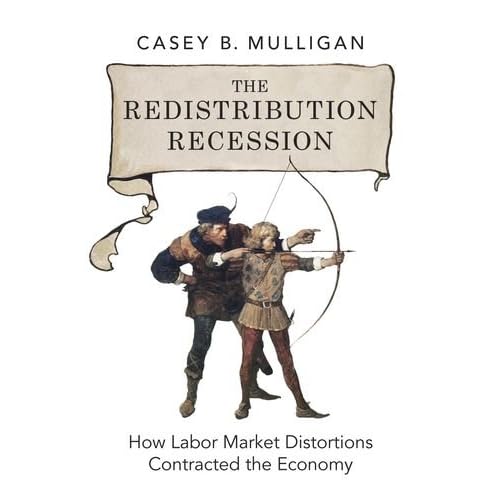“President Obama should read this book.”
-Diana Furchtgott-Roth, Senior Fellow at the Manhattan Institute and former Chief Economist at the U.S. Department of Labor.
-Diana Furchtgott-Roth, Senior Fellow at the Manhattan Institute and former Chief Economist at the U.S. Department of Labor.
“What if Keynesian economics is a bankrupt theory and the massive "stimulus" bill in 2009 made the economy worse, not better? Those are among the questions that Casey Mulligan asks in "The Redistribution Recession," a biting analysis of our current economic malaise.”
-Review in the Wall Street Journal by Stephen Moore
-Review in the Wall Street Journal by Stephen Moore
“Much
of the policy reaction to the Great Recession emphasized Keynesian effects on
aggregate demand and downplayed individual incentives to work, produce, and
invest. In contrast, Casey Mulligan’s
research focuses on how an expanded array of U.S. safety-net programs—food
stamps, unemployment insurance, Medicaid, and housing/mortgage assistance
programs—raised effective marginal income-tax rates especially for poor
families. These diminished incentives to
work help to explain the weakness of the U.S. economic recovery since the end
of the recession in 2009 and also explain why Barack Obama is justifiably
called the "Food-Stamp President."
Hopefully, future government policymakers will deliver better results by
learning from this important book.”
-Robert J. Barro, Paul M. Warburg
Professor of Economics, Harvard University
“Professor Mulligan analyzes the question of why has labor supply remained low and unemployment remained high during the current recession. He finds that the expansion of government safety net programs, along with their associated high marginal tax rates, decreases the economic incentives for labor supply. The question at issue is how much of the decrease in labor supply arises from these effects and their associated redistribution of income compared to the decreases in demand in sectors such as construction and manufacturing? He concludes that it is possible that nearly all or at least much of the decline in labor usage can be attributed to expansion of the social safety net. I highly recommend this sure to be controversial analysis of the effects of the Great Recession. Professor Mulligan has provided an innovative analysis of our current economic woes which should cause most economists to rethink their views of what has gone wrong.”
-Jerry Hausman, McDonald Professor of Economics, MIT
“Casey Mulligan’s The Redistribution Recession presents a heterodox perspective on the Great Recession. The book argues that redistributive and other policies enacted to help cushion the blow of the financial and housing market collapses have reduced incentives to work, and thus had the unintended consequence of significantly lengthening and deepening the recession. The rich set of empirical analyses that Mulligan presents in support of this argument challenges the view that the problem of recovering from the Great Recession remains solely one of insufficient aggregate demand. Moreover, the analysis will likely provide a foundation for future research on the Great Recession and how policymakers responded to it.”
-David Neumark, Chancellor’s Professor of Economics and Director, Center for Economics & Public Policy, University of California-Irvine
“Casey Mulligan’s cleverly titled book The Redistribution Recession ... makes the case that a major reason U.S. employment has been so low in the last few years is that, during the recent recession, the welfare state became so large.”
-Review in the CATO Regulation by David R. Henderson, research fellow with the Hoover Institution and an associate professor of economics at the Graduate School of Business and Public Policy at the Naval Postgraduate School in Monterey, Calif.
“While unrepentant Keynesians such as Paul Krugman (End This Depression Now! [New York: Norton, 2012]) are writing polemics that continue to argue that our slow recovery is the result of stimulus spending that is insufficient to jump-start aggregate demand, Casey B. Mulligan, a professor of economics at the University of Chicago, argues the reverse in this tightly reasoned new book.”
-Review in the The Independent Review by Richard V. Burkhauser, Sarah Gibson Blanding Professor of Policy Analysis, Cornell University.
“The endless campaign rhetoric on what to do about the recent recession left many wondering who or what was at fault. This book is an excellently researched attempt to provide an answer. Though the explanations and conclusions Mulligan presents are accessible to general readers, the methodology and econometric analysis require sophisticated training. This book provides a wealth of scholarly data and analysis...highly recommended.”
-Review in the Choice Reviews Online by J. F. O'Connell, emeritus, College of Holy Cross.
“Somewhere, Milton Friedman is smiling. Casey Mulligan ... has provided an unalloyed Chicago-style explanation for the U.S. economy’s poor performance during and immediately after the Great Recession.”
-Review in the Journal of Economic Literature by Christopher L. Foote, Federal Reserve Bank of Boston.
